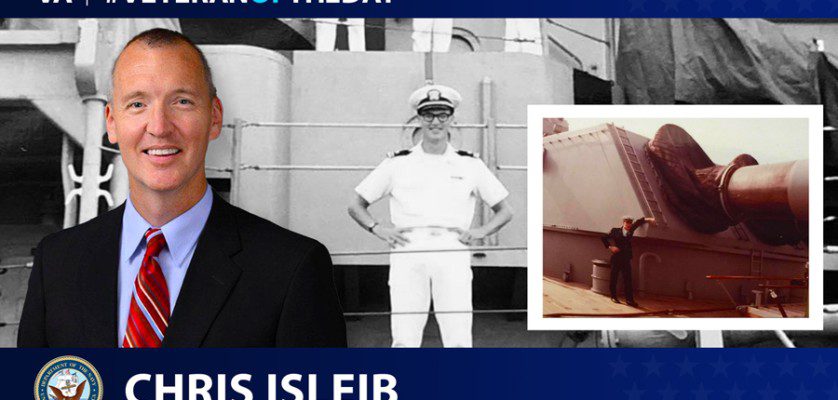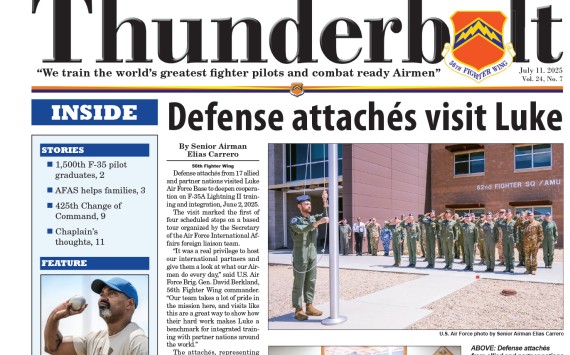Navy Veteran Chris Isleib grew up surrounded by examples of service. His parents both served in the Navy during World War II: His mother was a nurse, and his father was a chief engineer. And, his brother volunteered during the Vietnam War and spent his career in the military. Inspired by his family, the young Isleib decided to join the Navy.
He attended the University of Southern California on a scholarship and joined the Navy ROTC program where he drove ships. After touring USS New Jersey, the most decorated battleship in Navy history, Isleib knew he wanted to serve on a similar World War II-era ship. After graduating from USC in 1985 with a degree in Creative Writing, he was assigned to USS Iowa, a battleship that operated primarily in the Atlantic Ocean. He spent three years with USS Iowa and one and a half years on assault boats as an officer in charge of boat detachment.
After four years on active duty, Isleib wanted a change. Knowing he was a storyteller, he sought involvement with the entertainment industry. He attended graduate school at Boston University on a scholarship, pursuing his master’s degree in communication. He also kept a part-time job as a reservist with the Navy, working in public affairs.
Following his graduation, Isleib transferred to the Navy’s Liaison Office in Hollywood, Calif. His work focused on telling the stories of service members on the West Coast; specifically, he wrote and edited scripts for Navy-related films and television shows. During this time, he also served as the commander of five reserve units.
At the start of the Iraq War, Isleib was recalled to the Pentagon. While most media coverage at the time was focused on strategy, he told the stories of American soldiers serving abroad.
Isleib left the entertainment industry in 2006 and remained a civil servant at the Pentagon. He worked with the Department of Defense until 2009 before becoming the Deputy Director of the Air Force Press Desk. Then, in 2012, he transferred to the U.S. National Archives where he served as the director of Communications. It was here that Isleib learned of the movement to construct a national World War I memorial, commemorating the nearly 117,000 American soldiers who never came home. He realized the importance of remembering them and felt a duty to tell their stories.
In 2014, the centennial year of the war, Congress created an official commission to build the monument; Isleib served as the director of Public Affairs. The goal of the commission was to reintroduce the stories of World War I Veterans and create a permanent reminder of their service. The commission secured a piece of land that was highly visible and close to the White House before fundraising efforts were commenced; they needed an estimated $50 million. In 2016, through a design competition, the commission selected architect Joe Weishaar to be the lead designer alongside sculptor Sabin Howard. The memorial was formally unveiled on April 16, 2021. A bas-relief sculpture entitled “A Soldier’s Journey” will be added in 2024.
After the memorial was unveiled, the commission shifted its focus to education and partnered with established organizations, such as Scholastic Books and the History Channel, to keep World War I relevant to popular culture. The commission wanted to ensure that the Veterans’ stories would be remembered, even after the memorial was finished.
Nationally, the commission in D.C. served as a federal hub that helped various states establish similar offices. These organizations created state-level educational programs, including National History Day competitions, reenactments, and “living history” events. They also worked to clean up existing World War I memorials. The commission even collaborated with international counterparts, including the British 14-18 Now program and a French commemoration team.
After working with the commission for six years, Isleib transferred to the board of the World War I Valor Medals Review Task Force, an offshoot organization partnered with the centennial commission. Created by history and military experts, the task force reviewed the cases of soldiers who were either nominated and denied valor medals or downgraded to a lower honor. They especially focused on Black soldiers who were never considered for the highest level of valor medals due to the segregation of troops. This task force considered hundreds of medal nomination packages and made recommendations to the U.S. Army for review. Their work continues today at Park University in Missouri.
Isleib retired as a captain after nearly 30 years of service and works today as a self-employed communication consultant.
We honor his service.












